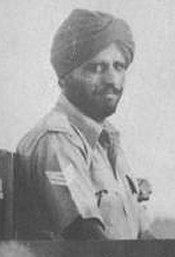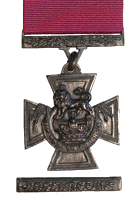Major Prakash Singh


Hav Maj (now Major) Prakash Singh VC (31 March 1913 – 23 March 1991) was a Jat Sikh recipient of the Victoria Cross, the highest and most prestigious award for gallantry in the face of the enemy that can be awarded to British and Commonwealth forces.
Parkash Singh was born on 31 March 1913 in Sharikar village, in the Lyallpur District of what was British India (now modern Pakistan). During the Second World War, Singh was a 28 year old Havildar serving in the Bren Gun Carrier Platoon of 5th Battalion 8th Punjab Regiment, British Indian Army (now 5th Battalion The Baloch Regiment of Pakistan Army). In January 1943, his battalion was engaged in fighting on the Mayu Peninsula in the Arakan, Burma, against Japanese forces, when the following deed took place for which he was awarded the VC:
- On 6 January 1943, the Bren Gun Carrier Platoon of 5/8th Punjab was attacked by a strong Japanese patrol near Donbaik on the Mayu Peninsula. The Platoon Commander was wounded and was forced to retire, handing over the command to Havildar Parkash Singh. Parkash Singh noticed two other carriers bogged down in a nullah, and under heavy Japanese fire. He immediately rushed to the rescue of the stricken carriers; calling on their crews to abandon the vehicles and run for safety while he provided covering fire. When his Bren gunner was wounded, he took control of the gun from him, and charged towards the enemy. Driving with one hand and firing the Bren gun with the other, he drove them out of their fixed positions. As he returned to pick the crews of the stranded carriers, he came under heavy enemy fire, but calmly rescued all eight men. On 19 January, the battalion carriers again came under heavy anti-tank fire in the same area, and several of them were destroyed including that of the Platoon Commander. The crews of the destroyed vehicles were given up for dead, and the rest of the carriers withdrew. But Parkash Singh wanted to see for himself if there were any survivors among the burning wrecks. Driving down the beach under intense enemy fire, he found the officer and his driver in their badly damaged carrier. The men were too badly injured to be moved, so Parkash Singh decided to tow their vehicle to safety. Despite the order of his Platoon Commander to go back and save himself, the fearless NCO rigged a makeshift tow chain and secured it to the damaged carrier, all the time exposed to enemy fire, and then towed it back to safety. For his feats of cool courage and selfless devotion on 6 and 19 January 1943, Havildar Parkash Singh was awarded the Victoria Cross although the initial recommendation was for a VC and Bar.[1] [2]
R S Joon[3] writes that In 1944, his Battalion was fighting along the Coast of Arakan. In a battle, the MG battalion which was with them suffered very heavy casualties. A number of carriers were abandoned with wounded British soldiers still inside. These were under heavy enemy fire and could not be recovered. Maj. Prakash Singh went forward on a truck. When fire came, the British driver of the truck ran away. Single handed and regardless of the bullets, Prakash Singh started collecting the causalities which included a British Officer. When he was pulling a carrier with the chain, he saw a company of the enemy advancing towards him. He un-clamped an M M G from the carrier and fired. The company stopped coming. Later, 70 dead were counted. Prakash Singh brought back all the wounded. A British General happened to see all this. Prakash Singh was awarded the Victoria Cross.
Promoted to Major
Prakash Singh later achieved the rank of Major in post-independence Indian Army.
Death
He died in 1991 aged 72, whilst undergoing heart surgery England, at Ealing, London. His Victoria Cross is displayed at the Imperial War Museum, London.
References
- ↑ Ahmad, Maj Rifat Nadeem, and Ahmed, Maj Gen Rafiuddin. (2006). Unfaded Glory: The 8th Punjab Regiment 1798-1956. Abbottabad: The Baloch Regimental Centre. pp. 312-13.
- ↑ The London Gazette, 13 May 1943.
- ↑ R S Joon:History of the Jats/Chapter XIII,p.229
Back to The Brave People

